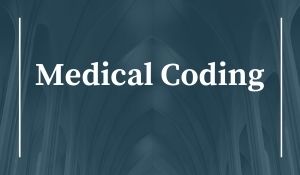
1.What is Medical Coding?
Medical coding or clinical coding is the profession of analyzing a patient clinical statement and translates them into standard codes specified in the classification system. Insurance companies use the translated document to process and reimburse their claims. Government, health care organizations, and research organizations use the data for studies and research.
2. What skills do you think a medical coder must possess?
The main skills a medical coder should possess are,
•Good knowledge of medical terminology, anatomy, and physiology along with the prerequisite degree.
•An understanding of various diseases, injuries, and medical procedures performed to treat them.
•Ability to read and understand medical and surgical reports and patient charts.
•Familiarity with classification and coding conventions such as ICD-9, CDC, etc.
•Capable of using computer or paper-based data management systems.
•Good communication skills to confer with doctors, surgeons, etc.
•Have good attention to detail and the ability to multitask.
•Have integrity as the medical coder is privy to confidential medical files of patients and other sensitive data.
•Focused and driven.
3. What do you know about ICD codes?
ICD code or International statistical classification of disease is a system of codes that was established by the WHO to describe the causes of injury, illness, and deaths. ICD codes are 5-7 character alphanumeric codes beginning with an alpha character. The ICD has two components:-
•ICD-10 CM or Clinical modification code for diagnostic coding
•ICD-10 PCS – Procedure coding system for inpatient procedure performed.
4. What are HCPCS codes?
HCPCS or Healthcare Common Procedure Coding System has three levels,
•Level 1 are 5 digit numbers maintained by the American Medical Association. The code comprises CPT codes to identify the medical services or procedures ordered by the physician or licensed medical professional.
•Level II are 4 character alphanumeric codes consisting of one alphabet and four numbers in the code. We use these codes to identify the products, pharmacies, and services not used in CPT.
•Level III codes are 5 character alphanumeric codes beginning with W, X, Y, or Z used when Level I and II are unavailable to specify a particular activity or diagnosis.
5. When are HCPCS modifiers used?
HCPCS modifiers are used by coders when we want to provide extra information about a service or procedure performed on a patient. We use the codes to specify.
•Specify the area of the body
•If the doctors performed multiple procedures in the same visit.
•The reason for discontinuing treatment.

6. What are DRG codes?
DRG codes stand for Diagnostic related groups. This system classifies hospital cases into 500 set groups. DRG codes are used only for inpatient claims from the time of admission to the time of discharge. Many insurance companies pay only according to these classifications, and the coder needs to get it right.
7. How is Medical Coding used in the practical world?
Medical coding has several real-world applications. The code has a financial aspect and helps to collect data for the WHO and governments to run programs to tackle different medical conditions. We use medical coding in,
•Insurance companies pay medical claims based on the medical codes they receive.
•It helps in the billing process.
•Data aids in the analysis of disease patterns in society. Governments can formulate programs to combat the disease.
•The information can provide statistical data for national and regional health and death cases.
8. What are some guidelines and tips you will give to a new medical coder who comes to work under you?
Some tips and guidelines to work on a medical code assignment are,
•It is important to code everything that has been documented. The code needs to be consistent with the medical record provided by the physician. Remember not to add anything or miss out on any information.
•Report the codes in the right order- The first code used explains the reason for the patient’s visit to the hospital.
•Follow the NCCI and MUE guidelines closely to prevent coding errors.
•Coding convention is modified periodically. As a coder, you need to keep yourself updated with the latest convention.
•Use modifiers only when necessary. Do not overuse or use incorrect modifiers.
9. What is the difference between ICD and CPT coding?
The ICD is a globally recognized international coding system designed by the WHO for diagnosing and describing medical conditions. While, we use the CPT or Current Procedural Terminology coding for reporting medical services and procedures such as diagnostic, laboratory, radiology, and surgery. CPT describes the procedures and medical services done by the physician or medical practitioner.
10. What is A “J” code in medical billing?
J code is a part of the HCPCS Code set. The codes correspond to non-orally administered medication and chemotherapy drugs. J-Codes are usually used for HCPCS Level II Code.
11. What is meant by epistaxis? and What is ICD-10 CM?
Epistaxis is the loss of blood from the tissues that line the nose. The ICD10 is the 10th revision of the International Statistical classification and related health problems. The code provides a common code to report and monitor diseases.
12. What is the difference between ICD9 and ICD10?
The main difference between ICD9 and ICD10 is that ICD-9 has 5 characters while ICD10 covers 7 characters. ICD 10 has laterality that ICD9 lacks.
13. What are the common billing errors in medical coding, and how do you prevent them?
The most common error is not including sufficient information for insurance companies to process the claim or accidentally entering wrong costs or codes. I usually double-check my entries against the patient file. I ask the physician for any clarification in case I notice missing details or confusing entries.
14. What method do you use to ensure you enter the data quickly and correctly?
While entering medical data, I get into a rhythm of typing the numbers while reading the patient files while entering the initial data. I review my work before submitting, pointing at important patient data on the file, and highlighting the data with my mouse to ensure they match.
15. How do you prioritize your work when entering billing codes for the patient?
Before starting my daily workload, I scan the patient files for urgent billing needs such as getting approval for a patient prescription medication to continue with the treatment. After that, I continue with the oldest file first to ensure the patient files are cleared, and there are no barriers to their treatment.
16. How do you deal with rejected or unpaid claims?
The longer claims go unpaid, the less likely it is they will be paid. Getting denied or rejected claims corrected and resubmitted can be a lot of revenue to a provider. A prospective biller or coders effectiveness and experience here is very important to a practice’s accounts receivables.
17. Are you familiar with Electronic Medical Records (EMR) systems? Which ones have you used? How did you use it?
The use of medical records software also referred to as EMR or EHR software – is increasingly important to providers. They may want the biller and/or coder to enter and maintain information in the EMR system. Employers value someone who is proficient in electronic medical records software and knows how to use it. It can also be a valuable asset to the biller and coder in their job when verifying patient information and treatments for a claim. Many billing and practice management software programs are increasingly integrated or interface with the EMR system.
18. Are you comfortable working with computers? What types of software do you have experience with?
The ability to create and share documents, reports, manage and upload files, and perform back-ups are skills that are helpful for medical billing and coding jobs. You would also want to mention any word processing (Microsoft Word) or spreadsheet (Excel) programs you have experience with.
19. What practice management or medical claims software do you have experience with?
Once you’ve learned about practice management or medical billing software programs, it’s pretty easy to learn another. Most well written software is fairly intuitive to use. If you’ve only used software, you might effectively make this point and emphasize your computer skills.
20. Do you know how to run reports? Can you customize reports?
Many practices need to run reports from their practice management software that show their financial status and performance, outstanding claims, patient balances, etc. The ability to create and customize these reports is a definite advantage. Many times when meeting with a provider, they will express a desire to see certain information in a certain format. Of course sometimes the reporting functions of the software can’t produce exactly what they want. Knowing how to extract information out of the practice management software – or database – is very important for a provider.
21. What specialties have you billed or coded for?
Certain specialties have unique coding and billing requirements. For example some mental health specialties have limitations on the number of visits and require pre-authorizations. These have to be monitored so there are no surprises for either the patient or the provider. If you don’t have experience in this particular provider’s specialty, emphasize your experience in billing for other unique specialties and your ability to adapt and understand the unique billing requirements for specialties.
22. How would you explain billing codes to a confused patient?
I know hospitals can be stressful for the patient. I will approach the patient with empathy. I will review and confirm the procedures that were carried out. I would list the codes with the corresponding procedure. I would ask the patient any other questions.
23. How would train physician and other staff on medical coding?
When training a colleague, I will prepare flashcards with all of the codes they need to know. I will review simple case files and give them feedback on things they missed or misinterpreted while praising them for the correct code.
24. What would you do if the patient file was unclear?
I would get in touch with the concerned doctor to clear any ambiguity. I prefer gathering all relevant information about the patient file to prevent errors.
25. What Specialties Have You Coded for?
This medical coding interview question is designed to assess your existing knowledge level, and how you plan to build on it. There are a huge number of specialties out there that require medical coders, from emergency medicine and wound care to infectious disease and neurosurgery. Your prospective employer will want to know what you enjoyed about your previous medical coding positions, as well as any technical knowledge you acquired or coding systems you used. This will help them make a more informed decision about whether the job you’re interviewing for is appropriate for your skill set. If there was a specialty that you coded for that you did not enjoy, try to explain this in a way that demonstrates a learning experience.

26. What is your opinion about undertaking continuous training opportunities?










